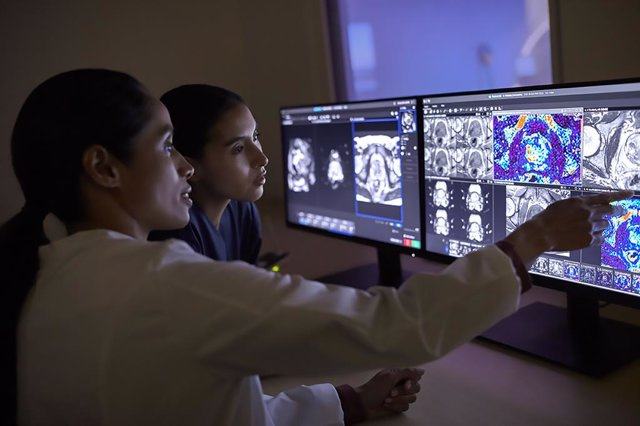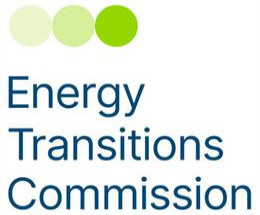Philips AI technology in MRI, combined with Quibim AI-based analysis software, allows specialists to obtain more information more accurately, quickly and easily in prostate cancer
MADRID, 26 Oct.
Approximately one in eight men will be diagnosed with prostate cancer at some point in their lives [1]. Currently, early detection is largely based on a prostate-specific antigen (PSA) blood test, which can help detect prostate cancer early, with this indicator being more effective and accurate in slow-growing tumors. They never extend beyond the prostate gland.
However, PSA screening tests also have poor specificity for clinically significant cancer, which can lead to many false positives and overdiagnoses. In these cases, patients undergo annoying biopsy tests that turn out to be negative, causing them great anxiety while waiting for the results, further complicated by a workload in the pathology area that could be avoided.
Although a magnetic resonance imaging (MRI) study is more expensive and time-consuming than a PSA test, recent research [2] demonstrates that MRI is a better triage tool to guide biopsy, is highly effective for more accurate diagnosis and Furthermore, it helps plan treatment and personalize therapy [3]. Reducing the number of unnecessary biopsies allows, on the one hand, to focus on designing better targeted prostate cancer therapy for cases that do need treatment and, on the other hand, represents overall cost savings.
Philips already integrates SmartSpeed AI software for acquisition and reconstruction in MR images which, thanks to the high image quality it achieves, provides greater diagnostic confidence with 65% more spatial resolution [4]. To complete this proposal, Philips and the Spanish company specialized in biomarkers Quibim have signed a multi-year agreement to work on an integrated solution that includes QP-Prostate software, based on Quibim's artificial intelligence [5] that automates the segmentation of the prostate gland in real time on MR images, providing quantitative information and standardizing the reporting of MRI prostate examinations.
This combination aims to provide physicians with the speed of image acquisition and diagnostic accuracy necessary to address the growing number of patients for whom an MR prostate examination offers higher diagnostic quality, more personalized treatment and a more appropriate patient management.
"This collaboration with Quibim is the latest example of our commitment to building an AI ecosystem in our Diagnostic Imaging portfolio to help detect different pathologies such as cancer early, improve the rate of first-time accurate diagnoses and streamline hospital operations. to offer better care at a lower cost," said Ruud Zwerink, general manager of MRI at Philips.
"Development with Quibim will be expanded in the future to address other forms of cancer beyond prostate cancer, where there is a need to improve efficiency and mitigate staff shortages, while offering high-quality cancer care to a increasing number of patients.
"By combining the best MR images obtained in the shortest time possible on Philips equipment and Quibim's QP-Prostate software, we can provide the speed and diagnostic confidence necessary to support all the different steps of patient care, from diagnosis to treatment and therapeutic evaluation. Lesion detection algorithms will evolve even further in the future and will improve prostate cancer screening [6]", stated Ángel Alberich-Bayarri, CEO of Quibim.
"This integrated approach, combined with features that improve workflow, will help mitigate the staffing shortages, high burnout rates and cost constraints that many radiology and oncology departments currently suffer from. Patients will also benefit greatly from much less complex and painful biopsy procedures [7] and more personalized treatment.
"Due to its sensitivity to diagnose aggressive tumors, MRI has become the cornerstone of the diagnostic pathway for prostate cancer. Now we have to improve its specificity to avoid unnecessary biopsies and its reproducibility to allow reliable diagnoses beyond the centers with high level of specialization in this type of tumors," explains Professor Oliver Rouvière, head of the Radiology Department at the Hôpital Edouard Herriot in Lyon. "Two of the biggest challenges facing any AI software dedicated to prostate MRI are the ability to demonstrate good specificity while maintaining a high level of sensitivity. Above all, we have to deliver diagnostic results robust across different imaging protocols, magnetic field strengths, and vendors."
Philips MRI solutions and Quibim QP-Prostate software will be demonstrated at the Philips booth (
[1] American Cancer Society, Key Statistics for Prostate Cancer https://www.cancer.org/cancer/types/prostate-cancer/about/key-statistics.html
[2] https://bmjoncology.bmj.com/content/2/1/e000057
[3] Jimenez-Pastor A, Lopez-Gonzalez R, Fos-Guarinos B, et al. Automated prostate multi-regional segmentation in magnetic resonance using fully convolutional neural networks. Eur Radiol. 2023 Jul;33(7):5087-5096. doi: 10.1007/s00330-023-09410-9. Epub 2023 Jan 24. PMID: 36690774. https://pubmed.ncbi.nlm.nih.gov/36690774/
[4] Compared to Philips SENSE
[5] QP-Prostate is an FDA 510k cleared solution and a UKCA and CE mark (Class IIb) cleared solution under MDR.
[6] Automated lesion detection is pending regulatory clearance and is currently only available as a research-only solution.
[7] Elwenspoek MMC, Sheppard AL, McInnes MDF, et al. Comparison of Multiparametric Magnetic Resonance Imaging and Targeted Biopsy With Systematic Biopsy Alone for the Diagnosis of Prostate Cancer: A Systematic Review and Meta-analysis. JAMA Netw Open. 2019;2(8):e198427. doi:10.1001/jamanetworkopen.2019.8427 https://jamanetwork.com/journals/jamanetworkopen/fullarticle/2747475
About Royal Philips
Royal Philips (NYSE: PHG, AEX: PHI) is a leading health technology company, focused on improving people's health and well-being, and facilitating better results in the health cycle, from habits healthy and prevention, to diagnosis, treatment and home care. Philips leverages its advanced technology and deep clinical and consumer insights to deliver integrated solutions. Headquartered in the Netherlands, the company is a leader in diagnostic imaging, image-guided therapy, patient monitoring and health informatics, as well as consumer health and home care. Philips has recorded sales of €17.8 billion in 2022 and employs approximately 71,500 employees, with business operations and services in more than 100 countries. All news about Philips can be found in our News Center.
Contact: César García Requena, Brand













